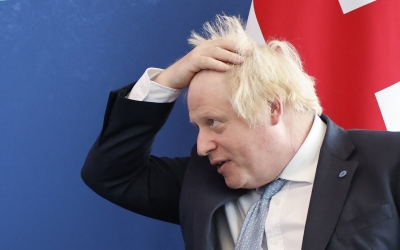Global Britain fails to make its mark in the Middle East

The UK’s 2021 Integrated Review made the case for post-Brexit Britain’s leadership in the world. In its foreword, Boris Johnson wrote of his optimism in the UK’s, “ability to seize the opportunities ahead”, particularly now that it could diverge in some areas from the EU.
However, despite the review promising “thriving relationships in the Middle East”, the region has actually seen very limited interest from London post-Brexit.
Despite having spent considerable energy and resources on the region in recent decades, and its historical ties as a colonial power, the Middle East and North Africa seem low down the list of Global Britain’s priorities. More often than not, UK policy reacts to events in the region, largely in line with and echoing statements made by its western allies in the US and EU.
At times this makes sense. The West is less influential in the Middle East than it once was and, since leaving the EU, the UK is less influential within the western bloc, so staying broadly aligned on key strategic issues makes sense.
However, that doesn’t mean there aren’t still opportunities for Britain to stand out and use its newfound "independence" to carve out a unique position for itself in the region while still supporting allies’ broader strategic goals. Such opportunities do present themselves, but Britain rarely seems interested in "seizing" them, in the way Johnson urged.
Recent examples are Tunisia and Lebanon. Tunisia was shaken in July when its president, Kais Saied, invoked emergency powers and sacked the prime minister, prompting accusations of a coup. The situation remains unresolved and the fate of Tunisia’s fragile democracy hangs in the balance.
Yet Britain, which the Integrated Review said would be promoting democratic values, upholding human rights and helping to shape the new world order, using active diplomacy, has been relatively silent. Neither Johnson nor Foreign Secretary Dominic Raab has commented on events in Tunisia, while the Foreign Office released a short, timid statement urging all sides to respect “democracy, transparency, human rights, and free speech”.
If anything, this is even meeker than comments made by allies, with the US urging Tunisia to “return to the democratic path”, while the EU urged parliamentary government to be restored, though neither set any deadlines or punishments were Saied to refuse.
Democratic credentials
The space was there for Britain to be more active. With Britain not especially close to the Tunisian government or a key trade partner, it could have afforded to be more robust in its concern over Saied’s move. This need not mean condemning him completely, an unwise move given the complexities of the Tunisian case, but pressing more firmly for a timetable to restore parliamentary government would have allowed London to show its democratic credentials above and beyond its allies.
Likewise offering incentives for doing so in the form of aid, notably much-needed Covid vaccinations, might have been another way of emphasising Global Britain’s values. Instead, the UK looks disinterested at best and disingenuous at worst when it comes to supporting democracy.
Similarly, in Lebanon, more could have been done. One of the Middle East’s other fragile democracies has been suffering an economic and political crisis for years, but Britain and other western governments have offered only limited support. Raab at least has spoken about this recently, listing at a conference on Lebanon the aid the UK provided after the 2020 Beirut explosion. Yet while recognising that a political solution is the only way forward, and urging reform from Lebanon’s corrupt political elite, the UK and its western allies have done little beyond words.
Again, there is an opportunity for Britain to lead. In July, the EU finally placed sanctions on culpable individuals in Lebanon and there’s no reason why the UK could not similarly place its new "Magnitsky" measures on the same people.
Arguably, if it really wanted to lead in Lebanon it would have done this earlier. While France is currently the leading western state trying to help break the Lebanon impasse, its efforts are still relatively limited and there is scope for Britain to play a greater role if it was so inclined.
The UK has spent a disproportionate amount of attention on the Middle East in recent years, gaining little and often doing more harm than good
And yet increased British efforts in either Tunisia or Lebanon seem highly unlikely. For all the Integrated Review’s talk of wanting to help shape the new world order and promote democratic values, it is clear that the Middle East and North Africa is not the intended focus of this rhetoric.
Post-Brexit Britain has more limited capacity and bandwidth for foreign policy and most energy is instead being focused on Europe (carving out a post-Brexit relationship) and South East Asia, where London seeks to expand its presence.
This isn’t necessarily a bad thing, as the UK has spent a disproportionate amount of attention on the Middle East in recent years, gaining little and often doing more harm than good. That said, stepping back is not the same as stepping out, and more modest engagement in the region should not mean jettisoning diplomatic innovation and seizing apt opportunities.
Crises such as those in Lebanon and Tunisia, less well reported than more high-profile cases in the Middle East but important security and governance concerns, actually provide chances for Britain to show its value as a newly "independent" actor.
Likewise, there is scope to enhance Britain’s relationship with other less high-profile Middle Eastern allies, such as Jordan and Oman. However, despite Johnson’s confident boasts, few such opportunities are currently being seized.
The views expressed in this article belong to the author and do not necessarily reflect the editorial policy of Middle East Eye.
Middle East Eye delivers independent and unrivalled coverage and analysis of the Middle East, North Africa and beyond. To learn more about republishing this content and the associated fees, please fill out this form. More about MEE can be found here.







